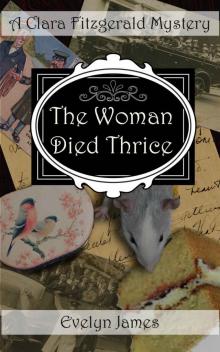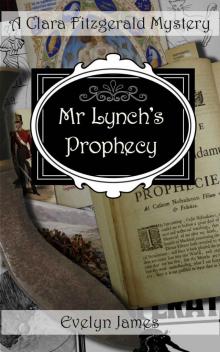- Home
- Evelyn James
The Woman Died Thrice Page 13
The Woman Died Thrice Read online
Page 13
“Mrs Crimp even tried her hand with some pencils she bought in the village shop!” Tommy laughed. “I don’t think even she was impressed by her efforts!”
“Then perhaps I shan’t risk bringing out my pencils!” Clara chuckled.
“Oh, but you must! They cost enough!” Tommy winked at her. “Now, what did you find in Mrs Hunt’s room?”
“Nothing revealing, except for a medicine bottle and a list of names. It seems Mrs Hunt was keeping track of some of her fellow charabanc passengers. But whether she deemed them suspects or was recording their names for another reason I can’t say,” Clara produced her notebook from a pocket and showed them the names.
“Mrs Unwin sat near us during luncheon,” Annie picked out a name from the list. “She talked a bit. She is a widow with three grown daughters and a fondness for hat pins. I can’t see her connection to Mrs Hunt, she certainly didn’t mention one.”
“Mr Hardwich,” Tommy pointed a finger at the paper. “He was a dealer in butterflies and beetles, of all things, before he retired. You know, the sort people put in little glass cases or paperweights. I happened to talk to him while at the edge of the lake. He made no mention of Mrs Hunt either.
“And this Captain Blake,” Tommy ran down the list further. “He is around my age. Can’t really see why he is on this tour, to be honest, he doesn’t seem to much care for it, nor the company.”
“I suggest those are two people you need to speak with a little more,” Clara said to her brother. “They would be more likely to speak to you than me. The rest of the list we can divide among us, and observe the respective individuals.”
“Might I make a suggestion?” Annie raised her hand as if in school.
“Of course,” Clara told her. “This is a free discussion, after all.”
“I think it might be worthwhile talking to the servants within the hotel, they often see or hear things that others don’t. They may know more about the chamber pot mystery.”
“A valid point,” Clara nodded. “Can I leave that in your hands?”
“Naturally.”
Annie had barely finished speaking when there was a knock on the door. Clara asked the person to enter. It was the desk clerk.
“Miss Fitzgerald, there is a man by the name of Bankes on the ‘phone for you.”
Clara rose at once and followed the desk clerk back to Mr Stover’s office. The ‘phone receiver was resting off its hook on top of a pile of papers and Mr Stover was eyeing it as if it might bite. Clara gave a slight cough as she entered. Mr Stover glanced at her, then gruffly rose and left her alone. Clara picked up the receiver.
“Oliver?”
“Clara! I have Dr Day-Bowers ready to speak with you,” Oliver Bankes dropped his voice to a whisper as he said the next bit. “He is rather wary of telephones, thinks they emit electricity. He insisted I ring you first, I suppose he thinks if I don’t die, it is safe!”
Clara wanted to chuckled, but she didn’t. Quite a number of people were scared of all the new inventions that were flooding into Britain, indeed, there had been accidents involving the new technology, and no one could deny these new-fangled cars had claimed more than one life. But the telephone was not terribly new and, as far as Clara was aware, no one had died from using one.
“Let me speak to him Oliver,” Clara said.
The line went quiet a moment, though Clara could hear what sounded like the rustle of clothes on the wire. Finally Dr Day-Bowers came on the line.
“Good afternoon Miss Fitzgerald.”
“Good afternoon,” Clara responded. “Has my associate explained my concerns?”
“A little. I am deeply distressed to hear the news about Mrs Hunt. She has been my patient these last five years.”
“She was not a well woman,” Clara pressed.
“She was not,” Dr Day-Bowers confirmed. “In my opinion she was suffering from Parkinson’s disease. It is a deeply unpleasant condition characterised by uncontrollable tremors, usually in the hands, and muscle weakness. As the condition progresses the gait can be affected, the person may shuffle, be slow to move or, when they do move, do so in a curious fashion as if someone is operating them by strings. It later often develops into a psychiatric condition.”
“Is there a cure?”
“No. And the disease progresses extremely rapidly. The majority of patients after eight years with the condition will no longer be able to walk without assistance and, after ten years, we would expect the patient to be bedridden.”
“And Mrs Hunt knew this?”
“She was well aware,” Dr Day-Bowers gave a gentle sigh. “The condition would ultimately have left her requiring constant care. With no immediate family I imagine this was a great concern to Mrs Hunt.”
“You prescribed some pills for her?” Clara asked. “I found the bottle in her belongings.”
“Yes. They were a new treatment from America. Still experimental and unproven, but any port in a storm, as they say. It was too early to say if they were working.”
“Thank you doctor. Lastly, do you think Mrs Hunt may have considered taking her own life?”
“Many with her condition do,” Dr Day-Bowers said thoughtfully. “But I rather felt Mrs Hunt still had hope and the new pills gave her a reason to carry on. I was very upset to hear of her demise.”
“And she had no next of kin?”
“None recorded on my files, I’m afraid.”
Clara thanked the doctor and ended the call. It was curious, she thought to herself, here was Mrs Hunt clearly very ill and close to suffering a fate many would consider worse than death and yet someone still felt the need to try and dispatch her from this world. Either they did not know how ill she was, or they did not care to wait for the condition to take its course. It was time, Clara decided, to investigate those people on Mrs Hunt’s list.
Chapter Seventeen
Dinner proved a quiet affair, even Mrs Palmer refrained from discussions of murder and talk consisted of remarks on the weather and people’s varying opinions of Derwentwater. When dessert had been concluded and post-dinner drinks were being offered, Tommy excused himself to go in search for Captain Blake who had departed the table before the last course.
Tommy found the forlorn soldier in one of the hotel’s several lounges, this one set aside as a sort of music room with a grand piano and a shelf stacked with music sheets so that any guest might wile away an hour or two playing the ivory keys. Tommy was not altogether sure how to approach Captain Blake, but he had been charged with the task by Clara and refused to fail. He had noticed Blake on the charabanc, one of the few men of his age on the tour and looking distinctly out of place. He travelled alone and had not made any effort to befriend his fellow passengers. Very often he left dinner early and when he was at the table he rarely talked or joined in conversations. He was the sort of person it was terribly easy to overlook.
Tommy had also been a captain in the army during the war, though he long ago gave up using his rank. Tommy preferred not to be reminded of those horrific years and since he had no intention of returning to the military life, what was the point in retaining his title? He was Tommy Fitzgerald, civilian, and that was the way he liked it. But other men were different. Other men felt the need to use their rank as a shield or even a badge of honour – proof that they had served and people should pay them a certain respect for it. Whether that was how Captain Blake felt about his affix Tommy was yet to find out.
Captain Blake was playing out a sad classical tune on the piano. It sounded a little French to Tommy’s ears as he limped into the music lounge, using his sturdy walking stick to safely traverse him across the carpet. The discovery that he could walk again after years of being confined to a chair had filled him with elation, but there was still a way to go before Tommy could walk unaided, and he somehow doubted he would ever lose the limp. Perhaps that was his badge of honour? Proof that he served his time and took a bullet for dear old England. This holiday was certainly giving him the ch
ance to stretch his legs, but the ache in his back, thighs and calves suggested he may be overdoing it. He sank into a solid armchair near the piano with some relief. The slight groan he gave as the pressure came off his weary muscles was not feigned.
Captain Blake paused in his playing and looked over. He was a gaunt young man, the sort who look like they need several hearty meals to be considered healthy. He had high cheek bones and a sharp nose that might almost be described as Grecian. His eyes were an icy blue, almost to the point of being colourless, though a ring of indigo circled the pupils. His hair was an ashy brown, trimmed to a military shortness, so that it seemed as if he had only just stepped out of his uniform. He regarded Tommy with a coldness that chilled the heart.
“Don’t mind me, old man,” Tommy smiled at him lightly. “I just needed somewhere to sit and take the weight off this leg,” he tapped his right knee. “Needed to get away from the chatter too.”
Captain Blake cocked his head to the side and glanced at the door of the lounge which had been left ajar by Tommy.
“They do go on,” he remarked solemnly, then he returned to playing and went through the same piece of music once more.
Tommy noted he was not using a musical score and assumed he knew the melody off by heart. When he finished and the last note died away, Tommy asked;
“Is that a French tune?”
Captain Blake rested his hands on his knees. His eyes were still fixed on the piano keys as if he could still ‘see’ the music he had just played dancing over the keys.
“Possibly,” he said in his quiet, unemotional tone. “I learned it in Belgium.”
“I liked the French tunes,” Tommy mused. “Though I could never learn them off by heart like that. I’m rather a poor pianist. I remember there was a battered piano in one of the old houses we slept in during rest periods. We had a private who could play beautiful things on it, considering it was missing a key or two and probably hadn’t been tuned in years.”
“You were in the war?” Captain Blake enquired, watching Tommy out of just the corner of his eye.
“From 1914,” Tommy told him. “Until I took a bullet in No Man’s Land.”
He tapped the knee again.
“That was 1918. I thought I would never walk again, until I met this doctor in Brighton. I only just got back on my feet, quite literally, last month. This holiday is rather kill or cure,” Tommy grinned. “I consider myself one of the lucky ones though. Some of the blighters who survived their injuries, well, I imagine they wish they hadn’t.”
“That is true,” Captain Blake tapped one of the piano keys, making it play very softly. “I only served from 1917. I have no scars to speak of.”
“It’s the scars up here no one talks about,” Tommy rapped a knuckle on his temple. “That’s what this doctor has told me. He says it is why so many of the boys who came home have a bad time of it. I didn’t believe him at first.”
“They treat you with such derision when the pain is in your head,” Blake nodded slowly. “No one sees it, so no one believes it exists.”
Tommy paused. He sensed that here in Captain Blake he had found a fellow sufferer of what his doctor called ‘shell-shock’, it was a term many of Tommy’s fellow soldiers considered derogatory or a label for cowardice. Only a man who had suffered through it could understand.
“I used to have awful nightmares,” Tommy decided to offer Blake a lifeline, maybe that was a way to get him talking about other things. “Only my sister, Clara, really understood them. After I came out of the hospital she made it her duty to look after me.”
“You don’t have the nightmares now?”
“Only occasionally. Not like before.”
They were silent. Captain Blake continued tapping the piano key and playing a soft note. Tommy found it a little irritating.
“I have nightmares too,” Blake said very quietly. “I try not to sleep too much.”
“Clara thought this holiday would do me good,” Tommy said, a white lie since Clara had been offered the holiday as thanks for solving a case. “Is that why you are here?”
“Not precisely,” Blake watched his finger pressing the piano key.
“No, you don’t quite look right amongst the rest of them. All old ladies and spinsters, well, for the most part. I can’t imagine you choosing such a holiday if you had the option.”
Blake looked at him sharply, his eyes a little narrowed. Tommy expected a rebuke for his assumption, but it did not come. Finally Blake said;
“No, this was not my choice. It was a gift. A gift I could not turn down.”
Tommy nodded.
“People try to be kind. They think they can understand a man just back from war, but… well, they never saw the things we did,” Tommy paused because all this talk was stirring up his own memories, most of which were not pleasant.
For a moment he was lost in his thoughts, visions of dead friends flashing through his mind. Horrific battles, bloody messes that were once men, screaming horses, battering guns. A rain storm of shrapnel. A mist of gas. The images swirled up unbidden and Tommy felt the quick tightening of his chest that these memories always brought. He realised, quite suddenly, that Captain Blake and turned to sit sideways on the piano stool and was watching him intensely. Tommy blinked and glanced over at him.
“Sorry,” he said, abashed at his sudden lapse.
“That is how it catches me out too,” Blake said, his tone warmer than before. “All this around me, all this natural beauty – the lakes, the countryside, even this music, it stirs nothing within me. But those memories, when they come crashing back they remind me I am still alive. Sometimes I even crave them just to remind me I have any feelings at all.”
“I would give everything I have to be rid of them,” Tommy said wholeheartedly.
“At least you have family to distract you,” Blake responded without sympathy.
“You don’t?”
“My parents are dead. I have no other living family.”
“Then who gifted you this holiday?” Tommy asked, the first real question he had placed before Blake and something of a retaliation for the lack of empathy the latter had shown him just a moment before. Blake was the sort of man who could only feel sorry for himself and no one else could possibly suffer as he did. Tommy would hate to be a man serving under him.
Captain Blake gave a cold smile.
“A late aunt. Her idea of compensation.”
“She perhaps imagined it would help,” Tommy said. “I am sorry to hear she has departed this world. Presumably it was quite recent?”
Blake returned to tapping the piano key. A long, dreary note echoed over and over about the room.
“Very recently. Only yesterday in fact. But I shan’t weep for her. I had not seen or heard from her in over a decade. She cut my mother from her life in a temper over her marrying and subsequently having me,” Blake shrugged. “Had she not written to the family address the other month I would have assumed she was dead also.”
Tommy was turning this statement over in his mind. The aunt had only died yesterday? Blake did not seem to be grieving for her, rather he seemed amused by it all. There was something about his face that suddenly struck Tommy as familiar. It was the way he smiled condescendingly, he recognised it from someone else’s face, but his mind failed to offer him the name of that person.
“Must you go back to arrange her funeral?” he asked, surely a nephew must feel some compassion for a late aunt?
“I am more inclined to leave it to the authorities,” Blake said, almost yawning over the answer. “Apparently, my aunt was very secretive about my presence. No one seems aware that I exist!”
Blake found this most amusing and chuckled to himself.
“Surely you will attend though? As the poor woman had no other family.” Tommy asked, not liking this man’s reaction at all. He could forgive a lot when men admitted to suffering from shell-shock, but such callousness troubled him.
“That was her choosing,
” Blake said with a sneer. “I shall not weep for such a woman. You should understand, having met the old witch yourself.”
Tommy must have looked surprised for Blake laughed, and played a chord loudly on the piano with his left hand. Then he rattled out a brief ditty that sounded rather like the music they played at the pictures to accompany a dramatic moment in a silent movie.
“Dear man! You dined with her the other night! Not that I think you enjoyed her company. You shot daggers at her with your eyes until she relieved you by departing from the table, so don’t attempt to come high and mighty with me!”
“Who…?”
“Mrs Hunt, you fool! She was my aunt! She gifted me this trip and I had half a mind not to accept. But I did, and when I get here she is aboard also. She had never said anything about that,” Blake clattered the lid down on the piano. “And all she wanted to do was talk to me about my mother. I suspect she wanted to make amends for cutting her from her life, too late for that if you ask me! But she could not change her true nature and every sentence was some criticism of my mother, her only sister. She would say she was sorry and then attempt to justify her actions by pointing out some flaw in my mother, some forgotten sin she had committed that had caused this consternation. As if I cared! I was rather relieved when she wound up dead in Windermere, it saved me the bother of feeling honour-bound to invite her over for Christmas.”
Tommy was stunned by what he was hearing. He felt almost sickened by Blake’s admissions and the cruel nature of his response. But he also saw so much of Mrs Hunt in that young man, that he found himself also understanding the reaction. They were two grapes off the same vine. Neither could feel compassion, nor ever imagine themselves wrong.
“You look shocked, old man,” Blake laughed. “That’s what comes from prying into another fellow’s business.”
Captain Blake stood and strode across the room to the door.
“Don’t tell the police what I just told you, there’s a good fellow, or I may have to just pay you a visit and sort out that dodgy knee of yours,” with that threat Blake was almost out the door.

 The Woman Died Thrice
The Woman Died Thrice The Poison Pen
The Poison Pen The Fossil Murder
The Fossil Murder The Green Jade Dragon
The Green Jade Dragon Murder on the Mary Jane
Murder on the Mary Jane Murder and Mascara
Murder and Mascara Mr Lynch's Prophecy
Mr Lynch's Prophecy The Traitor's Bones
The Traitor's Bones The Valentine Murder
The Valentine Murder Death at the Pantomime
Death at the Pantomime The Cowboy's Crime
The Cowboy's Crime The Trouble With Tortoises
The Trouble With Tortoises The Monster at the Window
The Monster at the Window